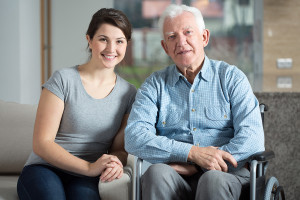5 Signs Your Loved One May Still Be Grieving
How to Help a Senior Who Is Grieving
April is Worldwide Bereaved Spouses Awareness Month – a time when the silent, oftentimes mishandled issue of grief over a spouse’s death is recognized as a real problem that needs to be approached and treated gently and differently, most especially in elder care. While grief and bereavement is a harsh reality to deal with for anyone at almost any age, the reality of the death of a long-term partner can be particularly overwhelming to senior adults.
 According to the 2012 US Census, husbands were more than three times as likely to pass away before their wives do, as observed in the 36.9% of women aged 65 years and older who had become widows, compared to the 11.5% of same-aged men who had become widowers. Losing a spouse can lead to feelings of guilt, loneliness, and isolation – all of which and more can last from months to years.
According to the 2012 US Census, husbands were more than three times as likely to pass away before their wives do, as observed in the 36.9% of women aged 65 years and older who had become widows, compared to the 11.5% of same-aged men who had become widowers. Losing a spouse can lead to feelings of guilt, loneliness, and isolation – all of which and more can last from months to years.
This period of grief, especially if the elderly adult does not have a good support system, can take a heavy toll on health and wellness. Interestingly, a study by the Harvard School of Public Health discovered that widows or widowers older than 50 years old have a 66% higher mortality risk for up to 3 months after their spouse’s passing.
Grief over the death of a spouse can be very different in each individual. It can be very obvious or silent, and it could last as short as a few months to years. According to the American Hospice Foundation, to help know if an elderly adult is still grieving, look out for these subtle signs:
- Increased forgetfulness. This can get in the way of daily routines, self-care tasks, medication schedules and more. Suggest writing down reminders and setting alarms.
- Disorganization. Attempting to accomplish even the most ordinary tasks during grief can be difficult among older adults. Help curb feelings of frustration and helplessness by writing a kind of “step-by-step” schedule for the day or week.
- Inability to Concentrate. If the bereaved spouse’s mind tends to wander during trivial tasks, such as reading and watching TV, he/she may still be grieving. Let them know there are other activities available as options, and be more vigilant of poor concentration when the spouse is driving or operating dangerous machinery.
- Lack of Interest or Motivation. This is a sign of a depressed mood. The surviving spouse, especially at an old age, could begin questioning the purpose of his/her life. You will also notice a loss of interest in activities that would usually be enjoyable to the bereaved. Your parent may question the purpose of life or why any effort is worth doing. Listen to them, express love and support, and keep trying to get them involved in something beyond their immediate environment.
- Fascination With Death or the Hereafter. Even though it is normal for older adults to contemplate death and dying, a fixation coupled with a depressed mood warrants a consultation with a therapist.
